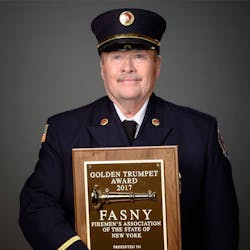“The stress of a cancer diagnosis never goes away, and I hope other volunteer firefighters going through this know how to ask for help.”
—Brian McQueen, Whitesboro, NY, Volunteer Fire Department
Brian McQueen is the past fire chief of the Whitesboro, NY, Volunteer Fire Department and a 41-year member of the volunteer fire service. In 2014, he was diagnosed with B-cell, non-Hodgkin's lymphoma. In November 2017, he was awarded the prestigious Firemen’s Association of the State of New York Golden Trumpet Award for his diligent work on occupational cancer in the fire service and his ability to work with state government officials in the passing of the state’s Volunteer Firefighter Cancer Law. He has been cancer-free for six years.
How did you learn that you had cancer?
In October 2014, I was battling a cold and what I thought may also be allergies. However, my wife, Sarah, noticed a lump on the left side of my neck. We were getting ready for a vacation, so she wanted me to get it checked out first. I went to my physician, who confirmed that my lymph nodes were enlarged, which possibly could have been from the cold. He prescribed medicine and said that if it did not clear to return to his office after vacation. By the time we got back, the growth on my neck had grown from the previous evaluation. I had some tests done and on Dec. 24, 2014, Sarah and I were told that it was B-cell, non-Hodgkin lymphoma.
What was your first reaction when you discovered you had cancer?
Ready to battle this head-on and thanks to a great recommendation from friends, I went to Memorial Sloan Kettering Cancer Center in New York City for a second opinion. We met with five nationally known oncologists for two hours reviewing my medical history and my hobbies, and a good portion of that time was spent discussing my volunteer fire experience. They confirmed the diagnosis and informed us that non-Hodgkin lymphoma is the fastest-growing cancer in the fire service. My immediate thought was, “The job I love protecting my community could be killing me?”
How did your brother and sister firefighters support you since your diagnosis?
The support that I received in texts, messages and phone calls was just amazing. My son and his wife would call each evening to see how all was going. Great friends of ours, Chief Dan Schwerfeger (also a cancer survivor) of the Floyd, NY, Fire Department and his wife, Betsy, gave my wife a card, a photo and a message that I was to open and read after each treatment.
The week before leaving for my treatments, past Chiefs Brian Healey of the Barneveld, NY, Fire Department, Brian Destefanis of the Deerfield, NY, Fire Company and Brian Palmer of the Town of Trenton, NY, Fire District wanted to sell helmet stickers to help alleviate the costs of the treatments and travel. I was so proud that this county volunteer fire service wanted to do this, but I could not accept the donations. I requested the money be used to help off-set the fiscal issues other volunteers would face going forward. That was the start of the nonprofit Believe 271 Foundation Inc. Its mission is to provide financial and emotional assistance to firefighters and auxiliary members diagnosed with cancer or other life-threatening illnesses.
What advice do you have for firefighters facing cancer?
For those facing cancer, know that you need to have someone walk the walk with you. You need to be able to communicate the good and the bad. You need to realize that you are not in this battle alone. If you know something with your health is not right, please see a doctor. The stress of a cancer diagnosis never goes away, and I hope other volunteer firefighters going through this know how to ask for help. The post-traumatic stress placed on them is one that their family, friends, or brother and sister firefighters may never see but must know when to recognize the need to help.
We need to make sure that we build cancer prevention education into our recruit programs. Educating our firefighters at a young age is the pinnacle of success in beating occupational cancer. Don’t place resources, such as the “Lavender Ribbon Report” or any other cancer resource, on your shelf or in your desk. Take the messages in them and use them in your meetings, your trainings and your everyday incident responses. Use the resources from the National Volunteer Fire Council, the Firefighter Cancer Support Network, the First Responder Center for Excellence, the National Firefighter Cancer Alliance and the International Association of Fire Chiefs—Volunteer and Combination Officers Section.






